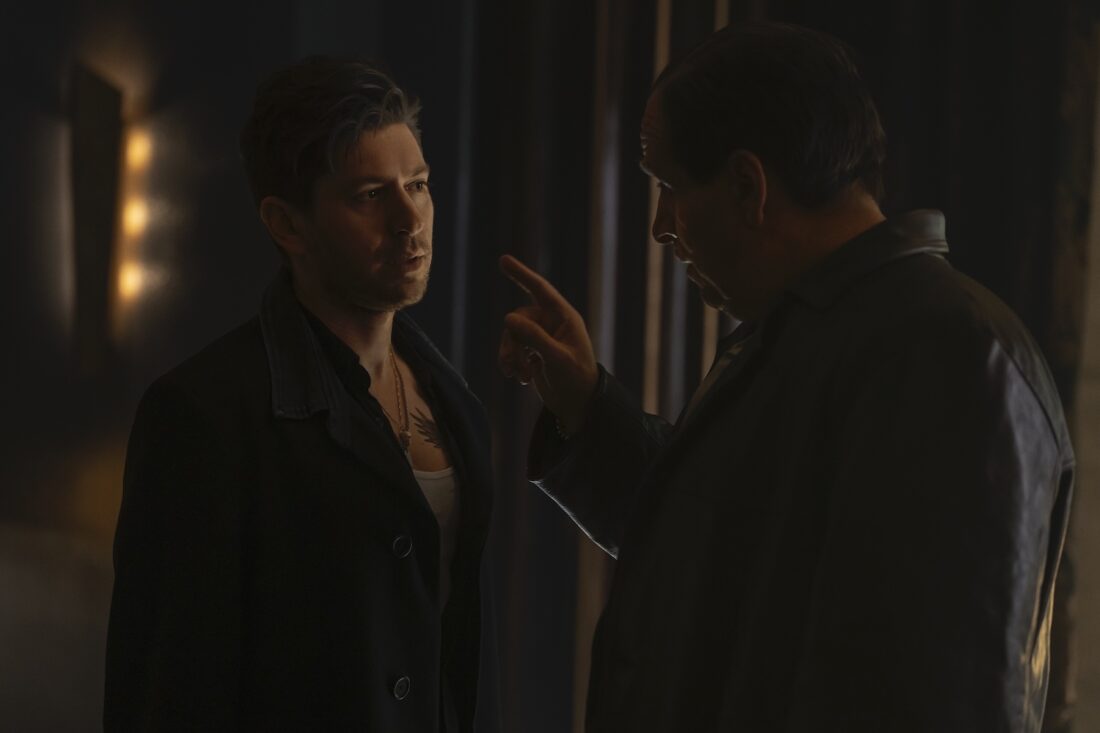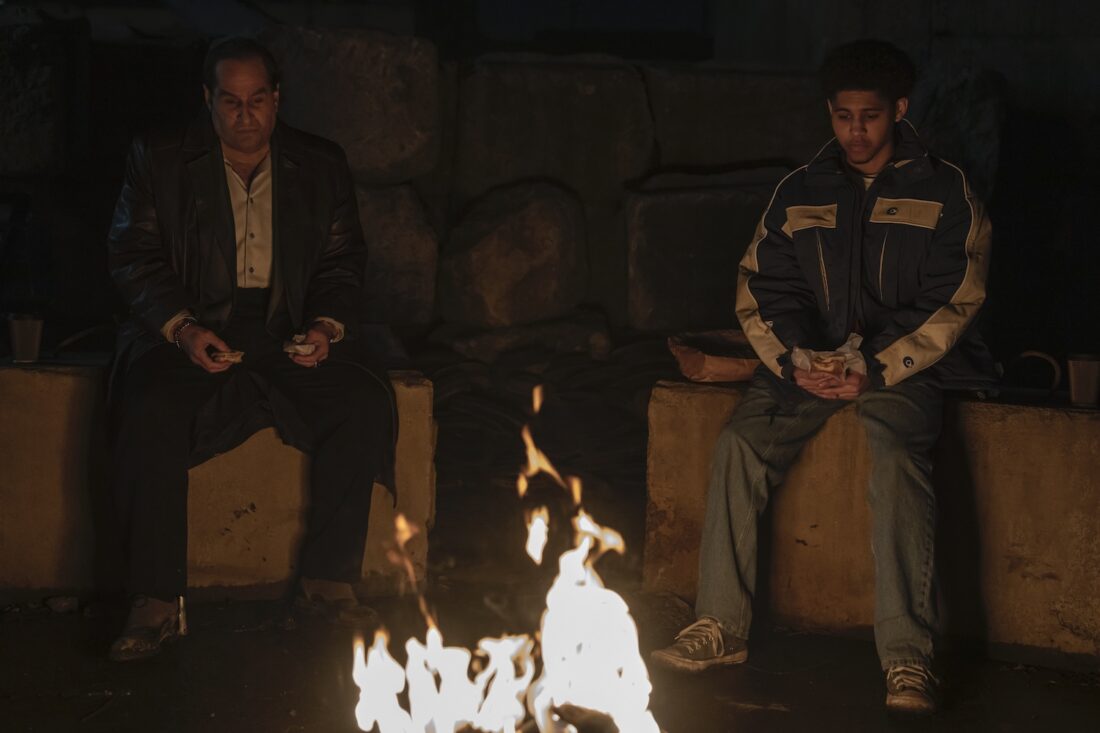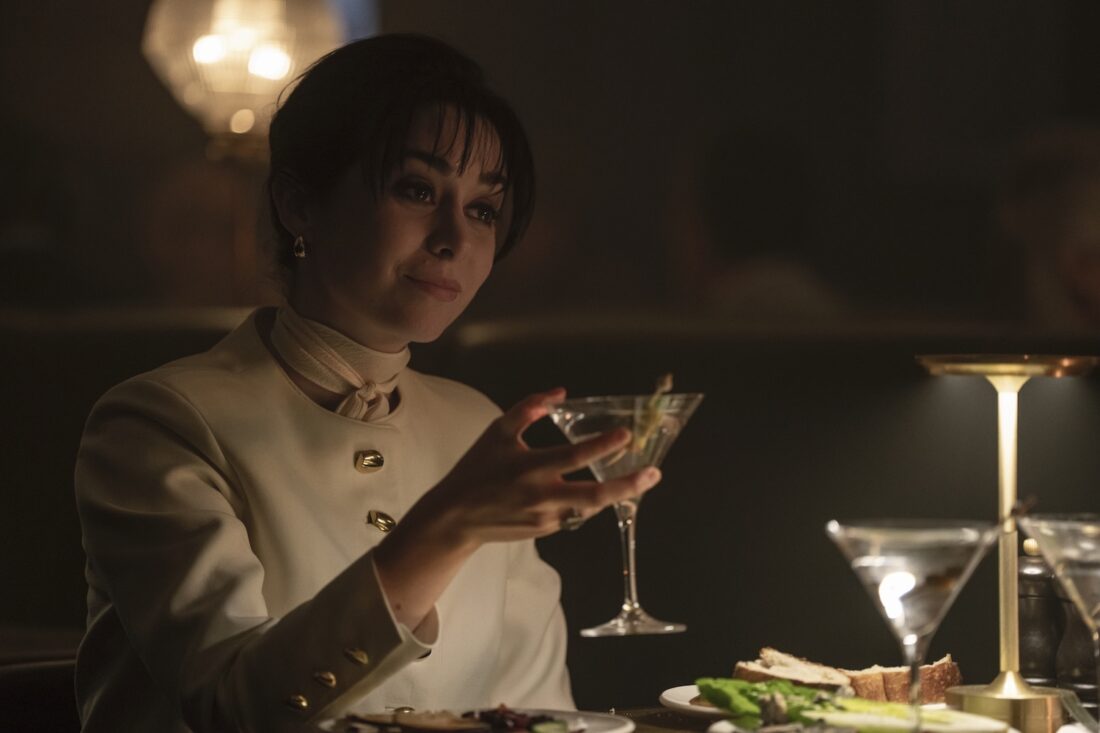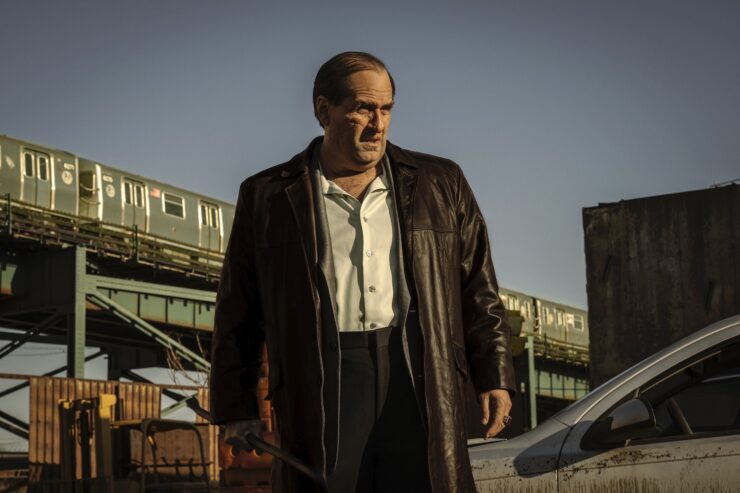The Penguin first appeared in Detective Comics #58 by Bob Kane & Bill Finger in 1941. He was seen stealing two expensive paintings, and using his theft of them from a museum as a calling card to convince a criminal gang to let him help them plan their heists. Penguin plans a bunch of jobs for them, then winds up killing the boss of the gang and taking over.
Eventually given the real name of Oswald Chesterfield Cobblepot, Penguin has continued to be a major villain in Batman’s rogues’ gallery for the eight decades since, and he stands out by being one of the few who isn’t batshit (sorry) crazy and/or a slave to a gimmick (though he often uses umbrellas and birds in his crimes, but it’s not a vital part of his shtick, and hasn’t always been consistently used). Primarily, he’s a clever, ruthless planner. Batman has even once admitted that Penguin is smarter than he is.
In the comics, Penguin has always been portrayed as an upper-class criminal, dressed in a suit and top hat with a monocle and a cigarette holder and an umbrella. Because DC has varied their continuities over the years, sometimes he’s legitimately upper class, and sometimes he’s playing at it, pretending to be a dandy in order to impress people.
Burgess Meredith played the Penguin in the 1966 Batman TV series and spinoff movie, and he added two features to the Penguin that were never really seen in four-color form, but became entrenched in the popular consciousness thanks to the popularity of the show: a penguin-like waddle and the “waugh waugh!” exclamation. (Hilariously, the latter was brought about by the cough Meredith acquired when he started smoking the Penguin’s cigarettes.)
In the 1980s, he was given an origin in the comics, establishing that he was made fun of as a child due to being short, overweight, walking funny, and having an oversized nose. He took refuge in ornithology and also his brains, eventually becoming a criminal.
Tim Burton’s interpretation of the Penguin for Batman Returns in 1992 also wound up becoming influential, as Danny DeVito’s Penguin was a grotesquerie, with malformed hands, pale skin, messed-up teeth, and so on. Those physical deformities were even used in Batman: The Animated Series, though the writing and Paul Williams’ vocal performances leaned more toward the comics’ interpretation of him as an aspiring member of the upper class.

Both the Gotham TV show (with a superlative portrayal by Robin Lord Taylor) and 2022’s The Batman went back to the character’s basics: a brilliant planner who is trying to get in good with the local criminal element. In Gotham, it was Jada Pinkett Smith’s Fish Mooney (a criminal created for that TV show), while in The Batman it’s the Falcone crime family. (The Falcones were created by Frank Miller & David Mazzucchelli in the Batman: Year One miniseries in Batman #404-407 in 1987, and expanded upon in the Batman: The Long Halloween miniseries by Jeph Loeb & Tim Sale in 1996.)
Played by a completely unrecognizable Colin Farrell under a crapton of latex and with a Noo Yawk accent, and with the given name of Oz Cobb, the Penguin is now starring in an HBO miniseries, which debuted last night, and which is serving as a bridge between The Batman and its forthcoming sequel.
The movie left Gotham in a bit of a mess. The Riddler destroyed the sea-wall, which flooded the city, and killed Carmine Falcone, the primary distributor of “drops” (drugs that get you high via eyedrops), after exposing him as the source of the intel that got Falcone’s primary competition, Sal Maroni, jailed.
The TV show picks up a week after the movie ends. Falcone’s son Alberto (Michael Zegen) is poised to take over the family business. The premiere episode opens with a summary of the events of the movie then shows Penguin going into Carmine’s loft to get at a secret wall safe. He retrieves some blackmail material and some jewels, then is caught by Alberto. Penguin tap-dances pretty expertly, saying Alberto saved him a trip, as he was going to deliver the jewels to Alberto. (He neglects to mention the blackmail material.) The two sit and share a drink and talk about what the future might bring, including a new drug that Alberto is working on bringing in that will supersede drops. Alberto at one point flashes the pinky ring that he took off of his father’s hand. It was Maroni’s ring, and Carmine had been wearing it like it was his own since Maroni’s arrest.
I’m watching this, and I’m thinking, okay, we’ve got the typical ne’er-do-well son who will fuck up what his dad left him, and Penguin will serve as his Wormtongue, manipulating him and improving his own position.
So imagine my surprise when Penguin—after Alberto demeans and laughs at him—shoots Alberto several times in the chest.
The whole tone of the episode changed for the better after that. Now Penguin has to deal with a corpse and the consequences of Alberto being dead. First he has to get rid of the body, which is a lengthy process, eventually stashing it in a junkyard (and also pocketing Maroni’s pinky ring). In this, he is aided by Victor Aguilar (Rhenzy Feliz). Vic is part of a gang of thieves who try to steal the rims off of Penguin’s purple (sorry, “plum”) car, and the only one who doesn’t get away from a pissed-off, gun-toting Penguin.

Vic’s purpose in the storyline is obvious: he’s meant to be Penguin’s protégé, plus he gives our title character someone to talk to. But he serves two other important functions, one a plot purpose for Penguin’s machinations this episode, and one a more philosophical one that serves as the series’ theme.
The plot function comes about when Penguin gets his first curveball. He’s summoned to the Falcone mansion to talk to two other high-ranking family members (James Madio and Michael Kelly), who tell him to shut down the drops operation and move it to another part of Gotham. Penguin thinks that’s insane, as there’s money to be made, but the family is insistent, as there’s too much heat in the flood zone. Penguin then pitches Alberto’s shiny new drug notion as his own.
The curveball comes when Carmine’s daughter Sofia (a superlative Cristin Milioti) enters the room. Penguin is surprised to learn that she’s been released from Arkham, where she was institutionalized after committing some murders. She’s apparently rehabilitated. And, as Penguin finds out over a very awkward lunch that Sofia insists upon them having, Sofia was in on Alberto’s drug plan, and she’s real curious as to how Penguin even knew about it, much less has the balls to claim it as his own. She also very obviously does not buy Penguin’s answer to the question of where Alberto might be (Penguin says he has no idea, but he’s probably on a bender somewhere and will rematerialize when he sobers up—he’s done it before).
Initially, Penguin panics, figuring Sofia’s going to come after him—and he’s right about that. He and Vic go to his mother’s house on the outskirts of town and he prepares to have her leave town. But Mama Cobb (played with brittle steel by Deirdre O’Connell) convinces him to take advantage of the opportunity instead of running away like a “pussy boy.”
So Penguin enacts a brilliant plan. He visits Maroni (the great Clancy Brown) in prison, offering to bring him in on the new drug, since the Falcones don’t seem to be interested. Maroni tells him to fuck off, so Penguin leaves, but not before returning the pinky ring to a shocked Maroni.
Then he goes home to find Sofia and her thugs waiting. There’s a chase and some fighting, but eventually she captures and tortures him. Said torture is interrupted by a car driven out of control (a cinderblock on the accelerator) onto the Falcone mansion grounds with Alberto’s body in the trunk, pinky cut off, and “PAYBACK” scrawled on the inside of the trunk. With Maroni now wearing his pinky ring again in prison, it points to Alberto being killed by Maroni’s people, and Penguin is off the hook.

Vic’s philosophical purpose in the plot is of much more interest, and it’s mostly seen in the conversation the pair have before Penguin kicks off his frame-the-Maronis plan. It’s also something that The Batman addressed to some extent.
America has always pretended to be egalitarian, but there’s very much a class structure. In The Batman, this was primarily addressed by the Riddler’s rant about how Bruce Wayne wasn’t a real orphan, because he got to live in his fancy tower with his butlers and maids and things, not in a shitty group home or halfway house. And here, we’re full of reminders that Oz Cobb is not one of the wealthy class, and he shouldn’t get above his station. That starts with his conversation with Alberto, and continues with the Falcone family telling him to shut down the operation and ignoring his pleas to keep the business running. For that matter, one of the first images we get in the episode is showing that the flood mostly damaged poorer neighborhoods—the wealthier sections of Gotham were untouched.
One reason why Penguin spares Vic and takes him under his wing (sorry) is because he recognizes the address on his driver’s license: a building that was destroyed by the flood. He’s got nothing. Penguin knows what that’s like. The Falcones, the Maronis, they don’t know what it’s like to be hungry—as Penguin himself says, they were “born full.”
On top of that, both Penguin and Vic are disabled in some way. In Penguin’s case, it’s a malformed foot; in Vic’s case, it’s a stutter. It’s another way that both of them can easily be dismissed by those with privilege and power, and it’s something they both have to overcome in order to be taken seriously.
It will be fascinating to see how this plays out over the course of the next seven episodes, if Penguin and Vic will be able to use their brains to win out over the criminal aristocracy. Probably yes, since Penguin is a major Batman villain who is supposed to be in the next movie, but Vic’s fate is another question, and it could go either way. The show has already muddled with expectations by having Penguin shoot Alberto before the title sequence of the first episode, so who knows?
The performances here are superlative. Farrell continues his amazing work from The Batman, giving us a person who is physically repulsive but charismatic as hell. You get why he’s able to get things done and why so many people greet him fondly. Feliz is perfectly fine as Vic—he really doesn’t get to do much but be scared, though I loved his word vomit nervously explaining to Penguin why he left the whole body in the trunk instead of cutting off the head and pinky-less hand like he was supposed to. Nobody ever went wrong casting Brown in anything, and O’Connell is also fantastic.
But the real star of this show is Milioti. When we first see her, she’s taut, controlled, and scary as hell. We see that she’s holding everything in, just like she was taught/conditioned to at Arkham—not to mention the demure aspect she was no doubt encouraged to present as a woman in a male-dominated setting. However, once Penguin is captured and she gets to torture him, the real Sofia comes out, but only through tiny cracks in the façade. It’s a bravura performance, and I can’t wait to see more of it over the next seven episodes.










